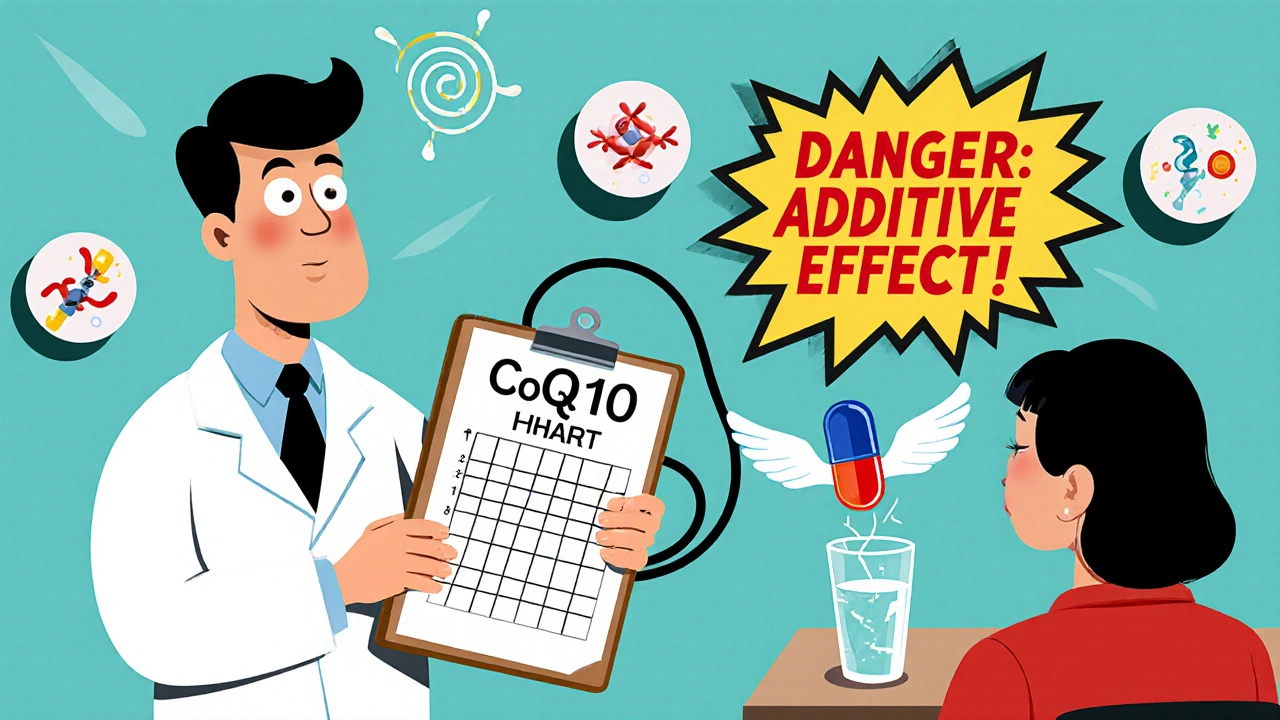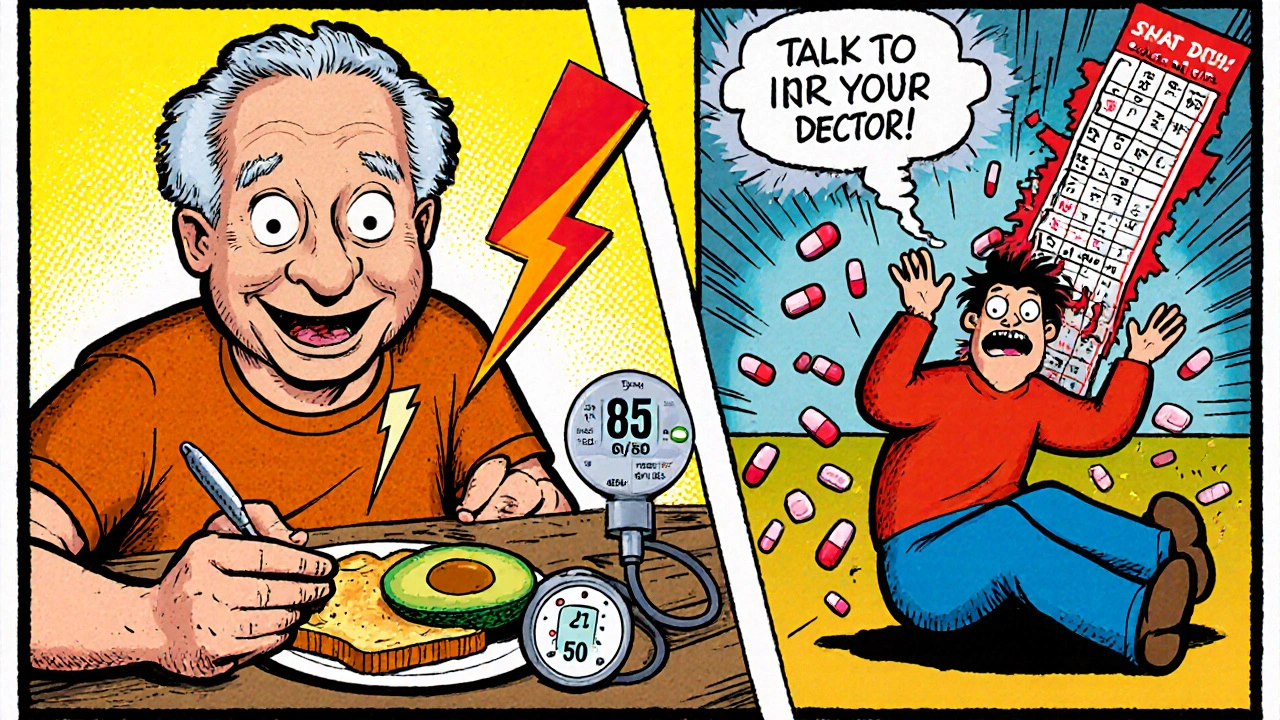CoQ10 Medication Interaction Checker
Interactive Tool
This tool helps you understand potential interactions between CoQ10 and your blood pressure medications. Remember: Always consult your doctor before making changes to your medication regimen.
Many people take Coenzyme Q10 to support heart health, especially if they’re on statins or blood pressure meds. But here’s the real question: does it actually help lower blood pressure - or could it make your meds work too well? If you’re taking lisinopril, amlodipine, or hydrochlorothiazide and thinking about adding CoQ10, you need to know what’s actually happening in your body.
What Coenzyme Q10 Really Does
Coenzyme Q10 (CoQ10) isn’t some magical supplement. It’s a compound your body naturally makes to help produce energy in your cells. Think of it like a battery charger for your mitochondria - the tiny power plants inside every cell. As you age, your body makes less of it. That’s why some people start taking it as a supplement.
It’s also an antioxidant, which means it helps fight off damage from free radicals. But when it comes to blood pressure, the story gets messy. Some studies say it lowers systolic pressure by 5-10 mmHg. Others say the effect is too small to matter. The truth? It’s not a magic fix. But for some people, especially those with treatment-resistant hypertension, it might make a real difference.
The Evidence Is All Over the Place
A 2019 meta-analysis of 43 clinical trials found that CoQ10 lowered systolic blood pressure by an average of 3.5 mmHg. That sounds tiny - until you realize that a 5 mmHg drop in systolic pressure can reduce stroke risk by 14%. But here’s the catch: those same studies were all over the map. Some used 100 mg doses. Others used 600 mg. Some lasted 8 weeks. Others went on for a year. And not all of them were well-designed.
The Cochrane Review, which is one of the most trusted sources in medicine, looked at just two high-quality trials and found no meaningful effect. Meanwhile, a 1990 study by Digiesi showed a 17.8 mmHg drop after 12 weeks. But that study was later dismissed because the data looked too clean - almost suspiciously so. So which one do you trust?
Here’s what actually matters: if you’re on blood pressure meds and start taking CoQ10, your numbers might drop. Not because CoQ10 is a miracle, but because it might be working with your meds. And that’s where things get risky.
How CoQ10 Interacts With Your Medications
CoQ10 doesn’t directly interfere with how your liver breaks down most blood pressure drugs. That’s good. But that doesn’t mean it’s harmless. The real issue is additive effects.
Let’s say you’re on 10 mg of amlodipine and your blood pressure is sitting at 145/90. You start taking 200 mg of CoQ10 daily. Within 10-14 days, your systolic pressure might drop to 130. Your doctor sees that and thinks, “Great, the med’s working.” But what if it’s not the amlodipine - it’s the CoQ10? Or worse, what if it’s both?
That’s when things get dangerous. One case report from Medscape described a patient whose systolic pressure crashed to 85 after combining 300 mg of CoQ10 with lisinopril and hydrochlorothiazide. He ended up dizzy, nauseous, and almost passed out. That’s not a rare fluke. It’s a documented risk.
And it’s not just with ACE inhibitors or diuretics. Animal studies show CoQ10 can increase the concentration of nifedipine in the blood by nearly 50%. That means your body is getting more of the drug than intended. Even if you’re taking your meds exactly as prescribed, adding CoQ10 could push you into unsafe territory.

What About Warfarin?
If you’re on warfarin (Coumadin), CoQ10 could be a bigger problem. The Merck Manual warns it may reduce warfarin’s effectiveness by lowering your INR - the measure of how long it takes your blood to clot. Case reports in the Journal of Pharmacy Practice show INR drops of 15-25% after starting CoQ10. That means you’re at higher risk for blood clots, strokes, or heart attacks.
It’s not a guaranteed interaction. But if your INR is already tricky to manage, adding CoQ10 without monitoring could be dangerous. Don’t assume your pharmacist or doctor knows about this. Many don’t. You have to bring it up.
Real People, Real Results
Online forums are full of stories. On Reddit, someone said they cut their amlodipine dose in half after four months on 200 mg of CoQ10 - with no spike in blood pressure. Another user on Drugs.com reported their doctor lowered their lisinopril after CoQ10 brought their BP down.
But here’s the thing: those aren’t controlled studies. They’re anecdotes. And in medicine, anecdotes can be misleading. One person’s success doesn’t mean it’ll work for you. And one person’s crash doesn’t mean it’ll happen to everyone. But both are real.
A 109-patient open study found that over half of participants were able to stop at least one blood pressure medication after adding CoQ10. That’s significant. But it also means nearly half couldn’t. Why? Because their bodies didn’t respond. Or because their BP stayed stable without needing to reduce meds.

What Should You Do?
Don’t stop your meds. Don’t start CoQ10 without talking to your doctor. But if you’re considering it, here’s how to do it safely:
- Start low. 100-200 mg per day is the typical range used in studies. Higher doses don’t mean better results.
- Take it with food - especially fatty meals. CoQ10 is fat-soluble. Without fat, most of it just passes through you.
- Use ubiquinol, not ubiquinone. The reduced form is absorbed 2-4 times better. You’ll get more bang for your buck.
- Check your blood pressure twice a week for the first month. Write it down. Bring the log to your doctor.
- Don’t combine it with other supplements that lower BP - like garlic, hawthorn, or fish oil - without supervision.
- If you’re on warfarin, get your INR checked before starting CoQ10 and again 2-4 weeks after.
Who Should Avoid It?
CoQ10 isn’t for everyone. Avoid it if:
- You’re on warfarin and your INR is unstable
- You’re already on three or more blood pressure medications
- Your blood pressure is already low (below 110/70)
- You’re pregnant or breastfeeding - there’s not enough safety data
- You have liver disease or are on medications metabolized by CYP3A4 (though interactions are rare, it’s still a gray area)
The Bottom Line
Coenzyme Q10 isn’t a replacement for blood pressure meds. It’s not FDA-approved for treating hypertension. But for some people, it’s a useful tool - if used carefully.
The science is mixed. The risks are real. But so are the benefits - for a subset of patients. If you’re tired of side effects from your meds, or if your BP won’t budge despite taking everything your doctor prescribed, CoQ10 might be worth exploring. Just don’t do it alone.
Work with your doctor. Track your numbers. Start slow. And never assume a supplement is harmless just because it’s natural.
Can CoQ10 replace my blood pressure medication?
No. CoQ10 is not a substitute for prescribed blood pressure medications. While some people may be able to reduce their dose after starting CoQ10, this should only happen under medical supervision. Stopping your meds without guidance can lead to dangerous spikes in blood pressure.
How long does it take for CoQ10 to lower blood pressure?
Most people see an effect within 10 to 14 days of daily use. The full impact usually takes 4-8 weeks. Don’t expect immediate results - and don’t rush to adjust your meds based on early readings.
Is ubiquinol better than ubiquinone for blood pressure?
Yes. Ubiquinol is the active, reduced form of CoQ10 and is absorbed 2-4 times better than ubiquinone. If you’re over 40 or have trouble absorbing supplements, ubiquinol is the better choice. It’s more expensive, but you may need a lower dose to get the same effect.
Can CoQ10 cause low blood pressure?
Yes, especially when combined with blood pressure medications. There are documented cases of systolic pressure dropping below 90 mmHg, leading to dizziness, fainting, or falls. This risk increases with higher doses of CoQ10 (300 mg+) and when multiple BP drugs are used together.
Should I take CoQ10 if I’m on statins?
Many people on statins take CoQ10 to reduce muscle pain or fatigue - a common side effect. While the evidence for this benefit is mixed, it’s generally safe to take with statins. However, if you’re also on blood pressure meds, you still need to monitor your BP closely, as the combined effect could be stronger than expected.


ASHISH TURAN
CoQ10’s not magic, but I’ve seen it help folks with statin muscle pain and borderline hypertension. Just don’t go wild with doses-200 mg with food, ubiquinol if you’re over 40, and track your numbers. Simple.